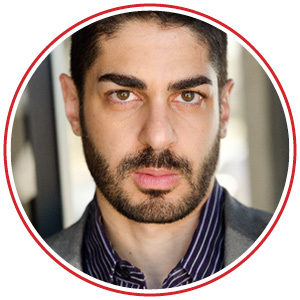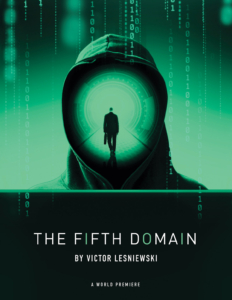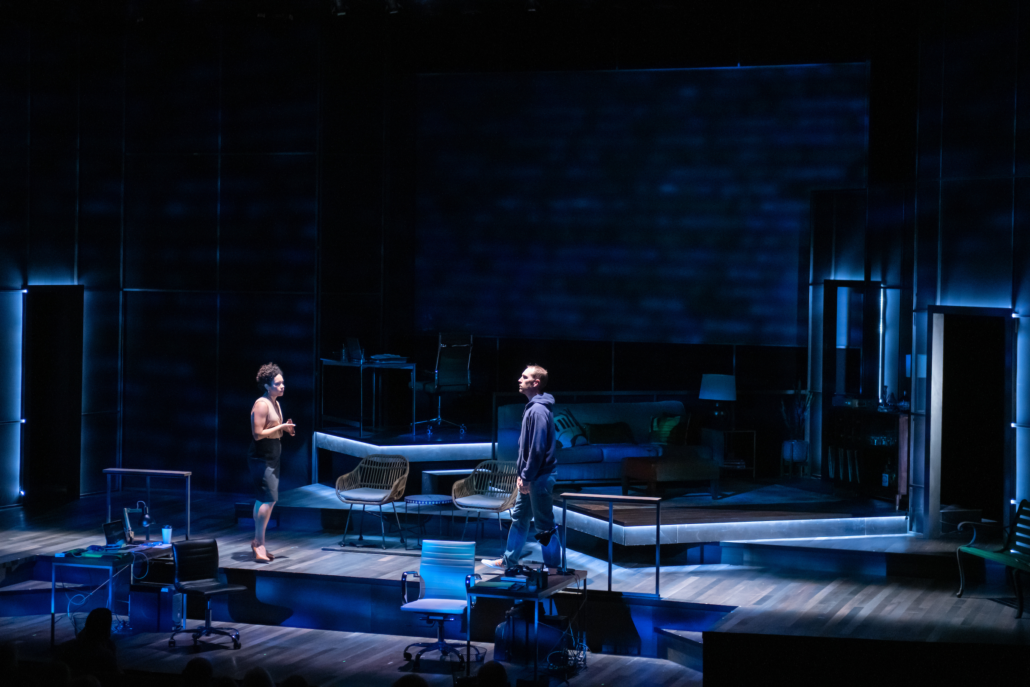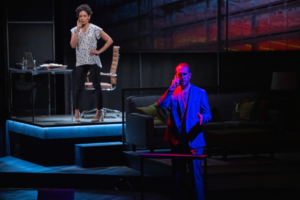PLAYWRIGHT INTERVIEWS
Interviews conducted and edited by Colin McGuire.
Though Victor Lesniewski claims he’s never hacked anything himself, the playwright knows more than the average browser when it comes to the intellectual property world. That’s because he’s made a living working in that field for years. Still, his passion for the creative arts, writing plays, and telling stories continues to inspire him whenever he puts pen to paper for another project. His current work, The Fifth Domain, is celebrating its world premiere this summer as part of the CATF slate. Steeped in the cyber world, Lesniewski played on his real-life knowledge of the IP world to create a thriller designed to captivate audiences all while confronting provocative issues that center around the nation’s security as well as the accountability of the U.S. government.
“This play is, in many ways, personal,” Lesniewski explained during a recent conversation that touched on everything from his background in tech to a protest play he hopes to write next. “In terms of the psychology of this play, it’s very much in line with conversations I want to be having as a human around the table with other humans.”
The following is the text of the conversation between CATF and Lesniewski:
I was doing a little bit of reading about you before this and I’m wondering how you came about the idea for the play. I know you had a background in tech, I believe?
Yeah, going back to my undergraduate degree in electrical and computer engineering at Carnegie Mellon. I always kind of had an affinity for math and science when I was young. In high school, I worked backstage, built sets, and dabbled in creative arts in non-writing ways. When I got to school, as much as I like math and science, I was like, I need a creative outlet. So, I took a playwriting class at Carnegie Mellon and luckily enough, the things that they’re most known for is engineering and drama. They have a really great, tight drama conservatory and they let non-majors in classes, so I was able to cross over and take a few classes. I built some sets there. I took sound design. And I started writing.
So, I have a day job in the intellectual property world — I don’t design or code anymore, thankfully, because I decided when I was younger that I didn’t want to write code for my life. But everything I do for my day job is related to cyber security and so forth. So, seeing that every day, and having this other job — for the last 15 years, I’ve been writing and trying to have a theater career, whatever that is, I went back to grad school in New York City at The New School for drama and did my playwriting MFA. I took a break for a few years from my day job and was like, if I’m serious about writing, I need to go get some training and be in New York for a while. So, I started writing and had a couple small shows there. Eventually, I started to hear this from people in the theater world: “Where is that play that involves everything you have to do every day at your day job?” And I said, “Nobody wants that play, it won’t be interesting to anyone.”
Over time, I understood there are ways to lean into cyber security and over the years, it’s become more prominent in common conversation, post-Snowden, post-Sony hack. I thought maybe audiences are prepared to handle this sort of subject matter in a way that was entertaining, but also drove some deeper discussion on the topic. That was the turning point for me because when I write a play, it has some sort of sociopolitical angle and I want to drive discussion around a certain topic. I got to the point where I was like, OK, I think I can figure this out. So, figuring out this other type of framework for the play, which hopefully makes it entertaining for people who love thrillers and a puzzle and a deeper kind of psychological journey — hopefully, it kind of leaves people entertained, but also thinking about all these larger topics around security and government accountability.
I wanted to ask about that. You have a tech background, but to my knowledge, you don’t have an espionage background, so how did you get into that?
I’ve never actively hacked anything. I’m not on the dark web, trying to infiltrate anyone for better or for worse. But in my gig in the intellectual property world, the technology I look at every day is in the network security, cryptology world. So, everything I do is some kind of analyzing systems that have to do with how to defend against people attacking your network. From the basic stuff like how we encrypt information to how to securely communicate with each other. All of the matter of the world is stuff that I’ve been steeped in for a long, long time. I did do a bit of additional research because every play I write, I usually do a ton of research and that’s sort of part of my process. For this one, I didn’t do as much research as I usually do because a lot of the ideas around the tech itself, I was up to speed on what a lot of that was. But I did do a little additional research into the spying world, just to make sure I was accurate in terms of looking at the scale of breaking into a computer and looking at the scale of international cyberwar. The story of the play bends toward this much more heightened stakes of cyber war between nations. I wanted to make sure I had a lot of those details correct.
Would you consider this one of your favorite plays? From the work you’ve done thus far, are you most connected to this one?
Yeah, I definitely think I’m pretty connected. There was a moment in rehearsal when the actor who plays our protagonist, who wants to go public with network security vulnerabilities that he feels aren’t really being handled the way they should be, looked at me and said, in the play, Troy is trying to say this about the world and he can’t and then he takes this other path, does these other things, and he was like, “It’s tripping me out, because it feels like you, as the writer, this was your journey, and because you couldn’t say these things, you put them in a play.” And part of that is, in some ways, true. I was never with the NSA or that deep in the world and I just kind of shrugged and said, “Yeah, anything any playwright writes, there’s got to be some personal way in. And with this, maybe that later is a little more obvious because I live in that world.” I certainly connect to it a lot more, and not just with Troy, but a lot of the other characters in the play, things they say are also things I say. I hope Troy will be a polarizing figure for a lot of audiences. I think a lot of people will like him and understand him and other people won’t like some of the things he has to say and that’s part of the discussion that ensues from the play. I think I put myself in all the characters because there are characters that push back on Troy in the play and that’s another side of me. You want to push back when you have a more extreme feeling about what you need to speak out about. We want to make sure that security is not being used as a cover to abuse rights. But we want to make sure there’s a balance there and we’re not endangering security in the name of transparency and accountability. So, there’s a lot of back and forth about that in the play. This play is, in many ways, personal. In terms of the psychology of this play, it’s very much in line with conversations I want to be having as a human around the table with other humans.
I read a pull-quote — “Turns out we’re only in the business of protecting people when it’s convenient.” Is that from the play?
I think it was in the play, but I want to say somewhat embarrassingly I don’t know if it’s in the play anymore. But it was in a draft of the play. I think the moment may have shifted, but I think that quote is very representative of Troy’s feelings about government and his particular take when he’s not allowed to go public with some of the things he thinks should be public. Whether or not he still says it, I don’t know. But it still resonates with everything happening on stage, for sure.
With this being the world premiere, are you nervous at all about that?
No. It’s funny. I’ve had a few smaller shows in New York. This is my first production by a larger theater institution, so it’s kind of a career step and I’m really excited about that. I’m not super nervous. I think every writer is different. Friends of mine who are playwrights have more nerves about their work going up. I think it has to do with the collaborative nature of theater for me. I feel like I’m here for the whole rehearsal process and within the process, by the time we get it up, every single line has been dissected and talked about and you’re putting the time in to make sure everyone is on the same page, so I guarantee I will get some nerves for the first couple performances because you want people to respond to it, whether they like it or not. Beyond that, I actually don’t get too nervous. Now that I said that, I’m going to hold myself to it [laughs].
The festival’s motto is thinktheater and when it comes to that notion, as well as the ability to be provocative, how do you think this play falls in line with that? Do you think this is a good example of the type of play usually in this festival?
Yeah, and I think that’s also why I’m not nervous. I think I’m in really good hands here and I think it’s really such a good fit for this play. It just feels like the festival has this bend toward sociopolitical, provocative theater, and that’s where I live as a writer. From the first conversation I had with Ed in 2019, I was all in on the idea of CATF even though I had never been here. As I started to look into what the festival was and talking to Ed directly and his passion for the thought-provoking issues, all of those things, I was just like, this is where I want to be. I hope audiences will agree that it’s a good fit for the festival. I’m excited about everything that CATF does. All the work around the production itself and lead audiences toward further discussions about the work. So, I think it’s a good fit and I think that’s something that holds true all the way through.
You said you kept your day job and keep calling it your day job — is writing something you want to do full-time? What are some of your down-the-line goals?
That’s a great question and it’s probably a question I should deal with more often. I moved to LA a few years back now. I lived in New York for seven years and had a bit of a start to a theater career there. I haven’t delved into the film and TV world yet but the last couple years, I’ve been thinking more and more about it because it seems like there’s a lot of theater folks who are able to make a living there. So, I’m thinking about that more and more, and thinking about trying to make connections to make that happen. In the meantime, I am still working my IT job. I might not be as passionate about it as I am my creative life, but it is much more consistent than the theater world in terms of income and insurance and a retirement fund. I just had a baby last year and my partner is also a creative so we’re balancing this idea of not trying to be truly starving artists, but also trying to maintain our creative lives. It’s a bit of a pickle, but we’re figuring it out. Luckily, she does a little bit of everything, which makes her more marketable than me in the creative world. She’s an actor and a writer. She directs a little. She builds mentorship programs for non-profits. Between her being able to patch some things together and me having a consistent income, we’re able to write when we can. In an ideal world, we would only be creative. I don’t know if the goal is to only do theater for the rest of my life; I think there’s always going to have to be something else. But whenever I have the time, writing is what I’m driven to do.
What do you think at this point in time would be a dream project for you? Is there something out there that you have to write before you’re done?
Yeah, I’m always about four ideas behind. I’m always, always generating things. I have a very personal play that’s basically autobiographical about growing up in this country about a racially ambiguous human. Over the last few years, everything that’s going on in this country, even though I have my own feelings about where I fit and I’m ethnically very mixed, it all pushed me over the edge to sort of write this play that’s sort of about what happens when you’re caught in the middle in a weird way, when the way you look and the expectation of the way you look don’t line up. The next thing out is I’ve really been investing some research time and deep thought into the way we protest. Peaceful protest. Violent protest. What it means for us as Americans and as humans and what each one of those can actually accomplish or not accomplish in our political system as it stands right now. I’m really starting to engage in research on that. There are no words on the page yet, but I think it will be an opportunity for me to evaluate historical avenues of protest that we as people have taken against people of power. So, yeah, I think there’s a protest play in the making, whatever may come of it, as well. It will be years down the line, though, so we may be done protesting by then [laughs].
Oh, I think we’ll be protesting for a long time to come.
[Laughs] I think so, too.




